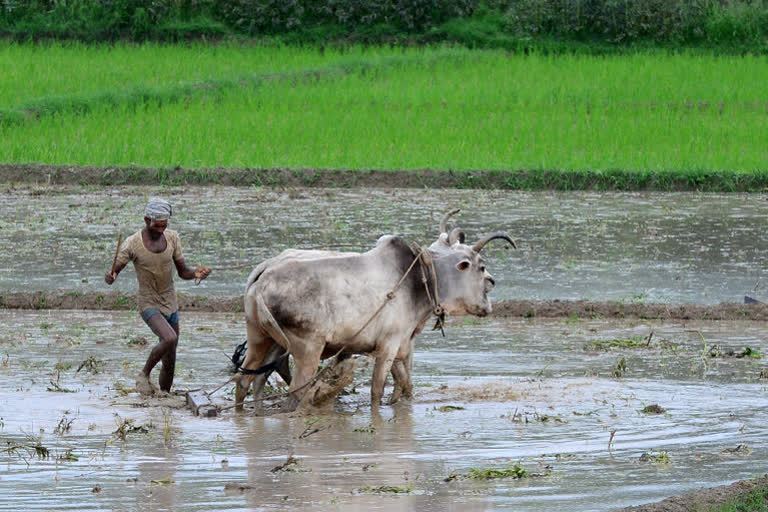Kolkata: Reacting to the NSS report that showed a decline in agriculture-based income in West Bengal, Trinamool Congress legislator and the principal advisor (agriculture) of the Chief Minister, Pardip Majumdar said that although he is aware of the findings in the NSS report, he will not be able to make any comments without going through it completely. But BJP slammed the Mamata-govt's lopsided agriculture policies that are forcing people to lose interest in agriculture. While senior Leftist farmers' leader and the CPI(M) politburo member, Hannan Mollah blamed flawed policies of both state and Central government's for present state of affairs in West Bengal.
Actually, in the 2006 West Bengal assembly elections, when the Buddhadeb Bhattacharjee- led seventh Left Front government came to power in West Bengal with a huge majority, one of the major architects of the victory was "Agriculture is our base and industry is our future." However, the charm of the glorious victory in 2006 was not really long-lasting.
Crushing that slogan and aided by the crutch of the farmers' movement, Mamata Banerjee-led first Trinamool Congress government came to power in the state in 2011 ousting the 34-year long Left Front rule. Gradually, Trinamool Congress has enhanced its numerical strength in West Bengal assembly and simultaneously the numbers for Left Front declined until it turned to zero in the 2021 West Bengal assembly elections.
Now the question is that whether the farmers' movement which played the role of the chief architect in promoting Mamata Banerjee to the chair of the chief minister in 2011 is still relevant and whether the farmers in Bengal are still clinging to their passion of farming and farmland. Or whether the farmers of the state are slowly shying away from their traditional route of farm-based income.
Now let us have a look at the latest report of the National Sample Survey (NSS) report on this count. The statistics of NSS's 70th round of the survey reveals that agriculture-based income only counts for 18.5 per cent of the average total monthly income of a farming family in the year 2019, the latest available on this count.
As per the survey statistics, in the year 2019, the average total monthly income of a farming family in West Bengal stood at Rs 6,028, out of which agriculture-based income counted for only Rs 1,126 (18.5 per cent).
Also Read: BJP vote bank in West Bengal is intact, claims Suvendu Adhikari
Now let us have a look at what the corresponding figures were in the years 2013, which was revealed in the statistics laid down in the 69th round of the NSS survey. In 2013, agriculture-based income counted for 24.6 per cent of the average total monthly income of a farming family that year. As per the survey statistics, in the year 2013, the average total monthly income of a farming family in West Bengal stood at Rs 3,980, out of which agriculture-based income counted for Rs 976 (24.6 per cent).
On the other hand, in the year 2019, non-agricultural income like wages, salaries or alternative income sources counted for 61 per cent of the average total annual income of a farming family in the state. According to that statistics, in 2019, the average total monthly income of a farming family in West Bengal stood at Rs 6,028, out of which Rs 3,721came from non-agricultural income.
In the year 2013, non-agricultural income counted for 53.4 per cent of the average total annual income of a farming family in the state. According to that statistics, in 2013, the average total monthly income of a farming family in West Bengal stood at Rs 3,980, out of which Rs 2,126 was from non-agricultural income.
Also Read: Is TMC's over confidence in by-polls a cause of worry for Mamata Banerjee?
From the statistics, one thing is clear that the dependence of the farming families in West Bengal on agricultural income is declining by the day. To share his views on this report, ETV spoke to Trinamool Congress legislator and the principal advisor (agriculture) of the chief minister, Pardip Majumdar. He said that although he is aware of the findings in the NSS report, he will not make any comments without the knowledge of sample size, how it has been done and for which purpose. "At the same time, I am yet to go through the report in detail, hence I would decline to comment on this issue right now," he said.
Talking to ETV Bharat, senior Leftist farmers' leader and the CPI(M) politburo member, Hannan Mollah said, "It is not new that the farmers; are losing interest towards farming. This trend started around 25 years back. The flawed agriculture policies of the Union and the state governments are responsible for it. That is exactly why on an average 52 farmers commit suicide daily these days," he added.
While state BJP general secretary, Sayantan Basu who blames it on Mamata Banerjee's lopsided policies, said, "Mamata came to power in West Bengal riding on the farmers' movement but after coming to power her government failed the farmers. It neither ensured supply of high quality seeds at affordable rates nor arranged for developed irrigation facilities. So farming is no more profitable. So it is natural that the farmers will lose interest towards farming," he said.
Also Read: 'Big leader' from BJP will join us, more in queue: TMC leaders



